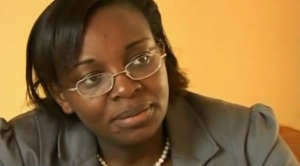 The interview of Victoire Ingabire’s daughter – Raissa that we reproduce here was first recorded in French by Ruhumuza Mbonyumutwa from Jambonews on October 21st, 2010. The following day it was published in English by online BayView National Black Newspaper.
The interview of Victoire Ingabire’s daughter – Raissa that we reproduce here was first recorded in French by Ruhumuza Mbonyumutwa from Jambonews on October 21st, 2010. The following day it was published in English by online BayView National Black Newspaper.Translation is by Mesha Monge-Irizarry, Idriss Stelley Foundation
This Oct. 21, Jambonews met with Raïssa, the eldest daughter of Victoire Ingabire. [Ingabire, who is widely considered the leader of the political opposition in Rwanda, has been jailed in Kigali, where evidence indicates she is being tortured – editor]. Tall and slender, the 21-year-old smiled and projected a positive attitude, which surprised us considering her situation.
She told us: ‘I try to put my feelings aside in order to help my mother as much as I can. I try to remain strong, to care for my little brothers, because I know that this is the best way I can help my mother.’
The last time she spoke with her mother was the day before her arrest. ‘We spoke normally. We were cool; we laughed. With my mother, we have always been comrades. We talk about everything, and for me it is difficult to imagine her as a politician. So far, it is the last time that I was able to speak with her.’
Last Friday, the Rwandan Embassy in Holland, however, promised Raïssa that she would be able to speak with her mother within 48 hours. “I told the ambassador that as far as I am concerned, I should not be considered as a politician. If I talk to my mother, I would not ask her about the situation in Rwanda or ask her, what any witnesses have stated, but simply, Mama, how are you? All I wish for at this time is just to hear my mother tell me that she is OK.
‘The ambassador listened to me attentively. She understood my situation. She seemed to want to help me, to the point that I believed it. But when one closes the door in someone’s face, it means one does not want to help. She started by elaborating on different ways to help us, but as soon as she decided it was time for us to leave, it was all over. Her attitude radically changed, and she left me in the dark regarding my mother’s situation. The ambassador talked to me and listened to me as a mother would, but she reacted as an ambassador.’
Last Monday, we came back, but we were refused entry and the embassy called the police, which escorted us out.
Ever since, Raïssa’s days have been full. Speaking to everyone who will listen, from left to right, she informs, she sensitizes, because she believes in the value of word of mouth. ‘A lot of people are not aware. They are surprised, shocked to hear about the situation. The Dutch do not understand why their government is not doing anything, but I think that it is critically important that they ask themselves questions.
‘To take action like this is the only way that I can keep myself from feeling powerless.’
When she is asked what she expects from the Rwandan community, she tells us that she wishes, first and foremost, that they become aware of the situation, that they know that her mother had a family, a job, a comfortable life in Holland before she left it all behind to take on the struggle in Rwanda.

She fought for the people of Rwanda, and now that she is in prison, more than ever she needs the people of Rwanda.
What holds true for her mother, according to Raïssa, also stands true for other political prisoners. She wishes that more people would understand their struggle and fight against the injustice that strikes them.

What I wish is for people to grasp that an innocent woman is in prison, and that this woman could be their sister, their mother, their daughter.
‘Today I speak for my mother, but I know that there are other political prisoners who deserve the support that my mother needs.


No comments:
Post a Comment